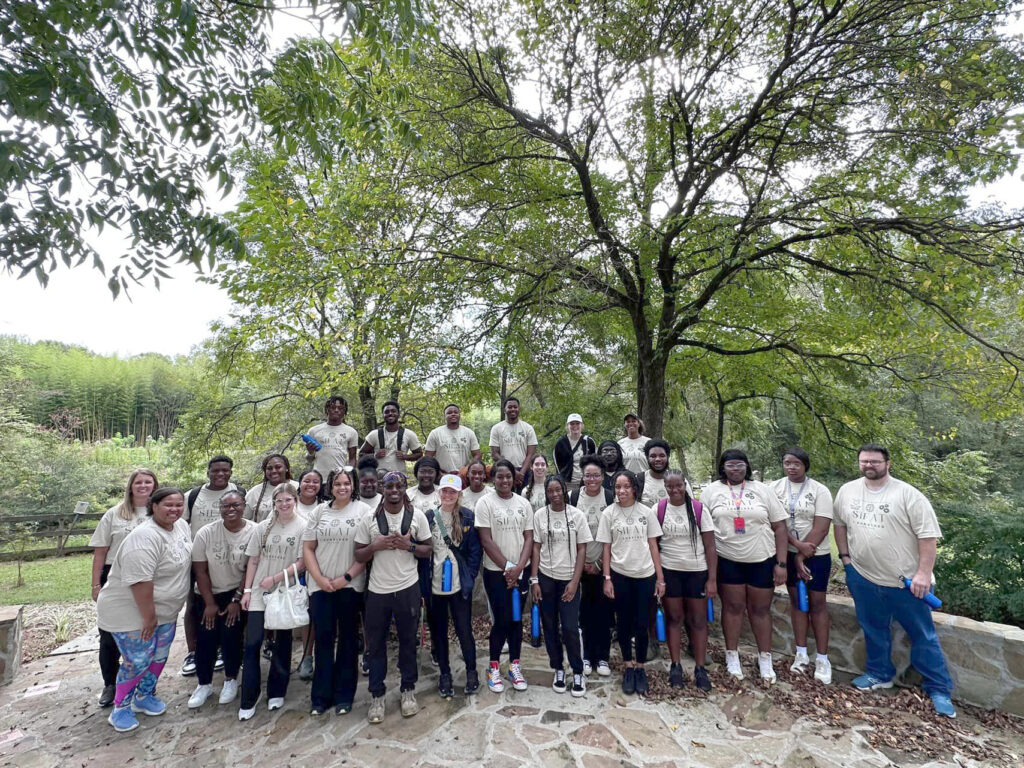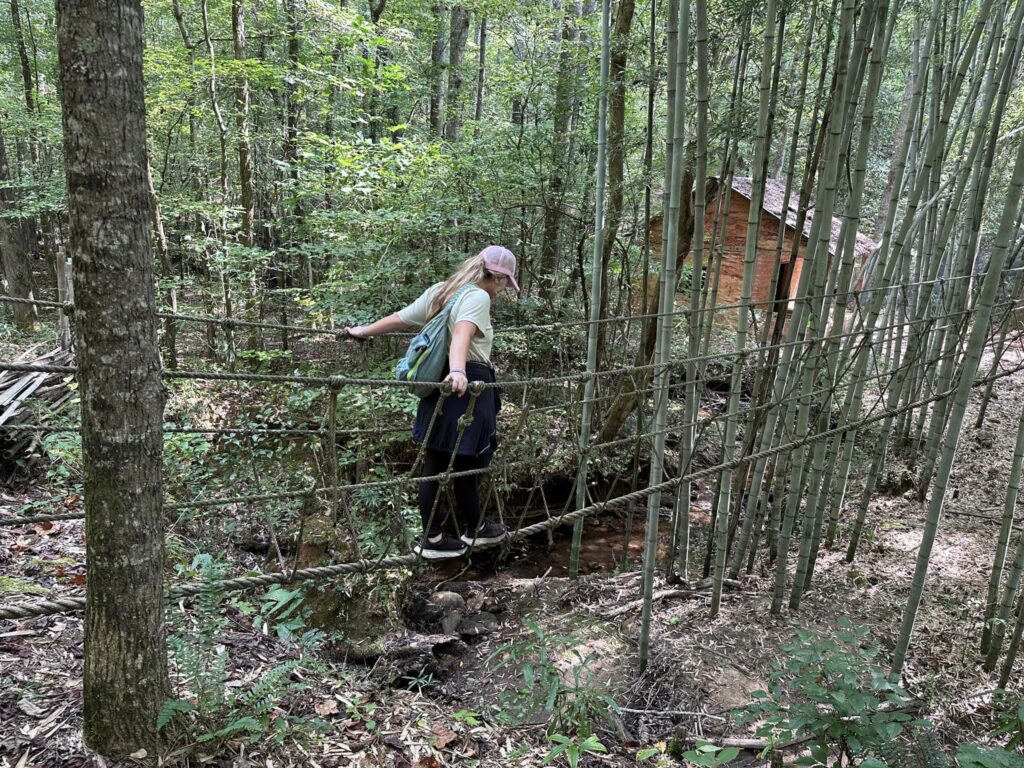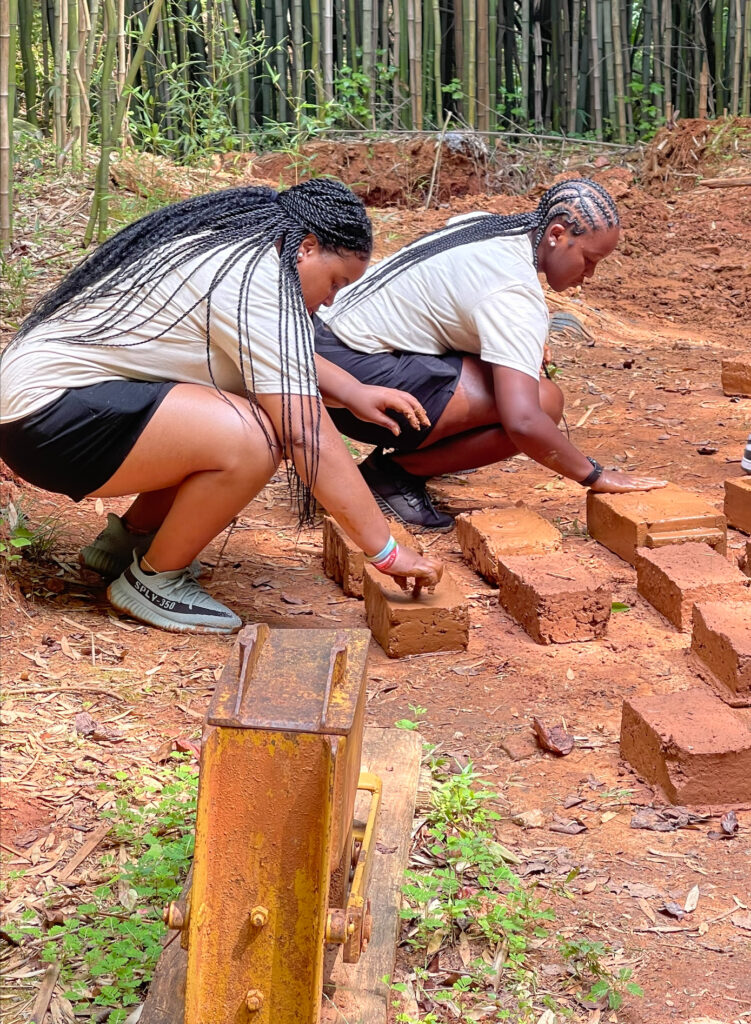
Story: Lisa Sollie
Imagine visiting a home in Guatemala or bartering for food in Uganda without ever leaving the country. That’s exactly what 37 UWA students had the opportunity to experience at the simulated rural Global Village and Urban slum at the campus of Southern Institute for Appropriate Technology (SIFAT) in Lineville, Alabama in September.
“I first learned about SIFAT when I was a student at UWA” recalled Roxcanna Bradley, advisor and retention specialist with the Center for Achievement, Retention, and Enrichment Services (CARES), and a 2019 and 2021 graduate. “One of my former professors, Dr. Rachel Dunbar, took a group of education students overnight to the facility and it was such an eye-opening experience. I thought some of our UWA 101 Freshmen seminar class students would benefit from attending it as well. I also reached out to Dr. Amanda Pendergrass and Dr. Courtney Vick in the College of Education, since I first learned of SIFAT through the COE, and extended an invitation to education majors as well.”
Bradley’s goal for taking the students was simple. “I wanted them to see what it’s like to live in a third world country and, as a result, hopefully they will realize how blessed they are to have what they have. I mean, we do have poverty in the U.S., and maybe some of these students are intimately involved in that; but it’s nothing like what people in the countries they will be learning about are experiencing. I hope this will spur some of them to get a passport and travel, if not overseas, at least beyond their hometown or neighboring state. We want them to experience more of the world,” she added.
What is SIFAT?
SIFAT was conceived in 1976 by Ken and Sarah Corson in the jungles of Bolivia where they and their four children moved to Sapecho to be pastors of a Bolivian Church. One of their converts, Quechuan mayor and community leader, Benjo Paredes joined forces with the Corsons and co-funded Centro Nacional de Technologia Sustenible (CENATEC), a non-profit Christian organization in Boliva. Three years later the Corsons returned to Alabama and established SIFAT as a training center whose goal is to help people stateside as well as different countries, cultures and social classes understand each other and show people how to better use technology (not phones and such) to improve their space such as sustainable gardens, building stoves, raising livestock or utilizing their water supply.
Located in the middle of nowhere with limited connection to cell towers and technology to mimic most third world countries, the 176-acre facility can house approximately 150 people in their main lodge, guest house, duplex and bunk house. An outdoor chapel, central meeting hall, fully functioning kitchen and cafeteria are also on the premises. Perhaps most eye-opening though is the Global Village where visitors like the UWA student group can experience typical housing accommodations in a variety of countries including Boliva, Philippines, Nepal, Ecuador, Nigeria, Guatemala, Liberia, India and Uganda.
When she first learned of the trip, Quada Brooks was thrilled to be part of a simulation that would introduce her to something she wasn’t normally used to.
“I was eager to see what it would like to live in someone else’s shoes and now that I’ve experienced it, I will never take what I have in this life for granted!”
Brooks, an elementary education/special education major from Carrollton, Alabama was especially moved when the group went to the café and were either told that they could eat or not eat. “That simulation was very emotional for me because as someone who has always been ‘spoon-fed’, it was hard for me to be told I wasn’t allowed to eat. Even when I was finally given permission to eat – I had to sit at the table for a few minutes to realize that what I just went through is what many around the world experience every day.”
Grace Hall, an elementary education major from Trussville, Alabama, signed up to attend the day long poverty simulation in order to get a better understanding of how different cultures and social classes operate and also get a feel for how people’s lives are impacted by poverty.
“The SIFAT trip definitely gave me a new perspective and greater understanding of what poverty looks like, especially the Global Village. Although the homes were pretty cool-looking and I was amazed at how they were made—some with wood or bamboo sticks and others out of bricks molded with red mud and hay—it was also shocking and I know it would be hard for me to live in one of them.”

Katie Ann Abbott, a special education major, went on the trip just for a day away from campus. The Corner, Alabama, native had no clue the experience would be life changing and leave an impact she would forever cherish.
A competitive person by nature, Abbott really enjoyed the grain challenge which highlights global hunger and three of its main causes: war, poverty and unequal resource allocation. Separated into countries and given the task of providing their nation with food for an entire year, participants must beg, borrow from or trade with other nations as each month goes by in order to procure enough grain for their nation to exist.
“I understood before that not all countries are as blessed as the United States but this experience furthered my understanding and it made me more grateful for my family, food and freedoms,” she noted. “It also inspired me to want to do my part in helping third world countries. I would love to go back to SIFAT and maybe do some training there.”
Hall’s favorite part of the grain challenge was getting to work together with other people, although she also found it very frustrating as well.
“There were so many things to consider with this challenge. For one thing, we only had a certain amount of corn and money to spend so we had to carefully decide if we were going to sell or buy corn. This was a vital decision for our country’s survivability and I never thought about how stressful it would be to make those decisions while also avoiding trying possible famines and droughts,” added Hall.

According to Bradley, students also had the opportunity to participate in the Global feast simulation which provides a simplified and individualized experience of the unequal distribution of food. The United Nations Children’s Fund (UNICEF) estimates that 55 percent of the world’s population is food insecure, 30 percent has access to food that is scarce, and 15 percent has access to enough food to make eating decisions based only on taste. Students also got to eat crickets, try Naan bread and build bricks made from red clay and hay.
“It was very fulfilling to see our students have a good time while at SIFAT. Some even expressed a desire to stay overnight, and I overheard one student speaking with the campus program manager, Josiah Corson, about possible internships,” stated Bradley.
“From an educational perspective, the SIFAT experience was especially impactful,” noted Vick, who attended along with several education majors. “I am thankful that some of our future educators were able to learn ways they can use the resources we have to teach others. The CARES program was so generous to include our students in this wonderful opportunity.”